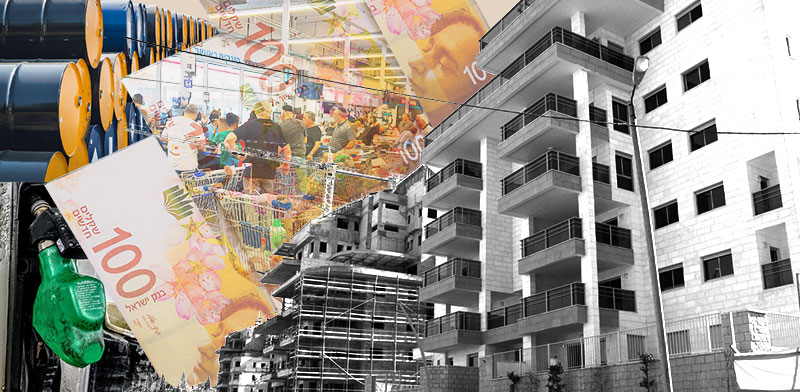
Analysts disagree on chances of interest rate hike this week
The Bank of Israel’s interest rate will be the main economic story this week. The bank’s Monetary Committee will convene tomorrow (Monday), and will have to decide whether to raise the central bank’s interest rate for the eleventh time in succession. The current rate is 4.75%. Another 0.25% hike will bring the rate to its highest level since 2006.
A great deal has changed since the Bank of Israel’s last interest rate decision on May 22. For the first time in the current cycle, the annual rate of inflation has fallen below the bank’s key interest rate; it was last measured at 4.6%. Private consumption, which fuels sticky inflation in Israel, is gradually moderating, and we are finally seeing the higher interest rates having an impact on the market.
The labor market is still tight, but, given the usual lag between interest rate hikes and their effects on the market, it could be that time will do its work without the need for a further hike, which would weigh on the market and on individuals.
Weakening shekel the problem
The problem lies in shekel exchange rates, which the Governor of the Bank of Israel and other senior officials at the bank have said many times is the element that could have the greatest impact in inflation. The shekel-US dollar exchange rate fell in mid-June, and, because of the strengthening of the shekel, which was at NIS 3.5/$, analysts saw a high probability of the next interest rate decision being to defer any rise, in order for the Monetary Committee to be able to examine the ongoing effect of the current rate on the economy.
The level of uncertainty in Israel has, however, grown recently. The judicial overhaul is again on the agenda, with the Knesset poised to give a first reading to a bill to abolish the reasonableness test in judicial review of executive decisions, and it looks as though the talks between the government and the opposition under the aegis of President Herzog have fizzled out, ending the prospect of reforms by broad consent.
Meanwhile, the security situation has worsened, with a military operation in Judea and Samaria and disturbances on the Golan Heights, although many believe that the small and short operation has not affected the shekel. With the shekel once again weakening, analysts’ assessments have become mixed.
“The market is still pricing in a very low probability of an interest rate rise next week,” Bank Hapoalim chief financial markets strategist Modi Shafrir told “Globes” last week. He did say, however, that another interest rate hike sometime this year was very likely, as part of the war in inflation.
“The main consideration is of course inflation,” Shafrir said. “Inflation was lower than expected in May, the exchange rate hasn’t risen too much, and so the Monetary Committee can afford to behave as in the US and other countries, and wait with another interest rate hike, especially given the decline in private consumption.”
RELATED ARTICLES

May CPI reading lower than expected
BoI markets chief: We see signs of inflation moderating
Rapid rise in apartment rents fuels inflation in Israel
Bank Leumi chief economist Gil Bufman writes in his latest market review: “Against the background of a continuing trend of interest rate rises around the world, and especially given the weakness of the shekel, another rate hike in Israel cannot be completely ruled out, but it will probably not come in next Monday’s decision.”
Bufman thinks that if the inflation environment resumes its rise, following very significant further weakening of the shekel, with the dollar-shekel rate stabilizing at around NNIS 3.8/$, “the Bank of Israel may raise its interest rate again later this year.”
By contrast, a report by investment bank Morgan Stanley released at the beginning of this month forecasts that the Bank of Israel will raise its interest rate this time round. It says that the central bank will raise its rate to 5%, and could leave it at that level until the end of the year. Morgan Stanley says that if the political uncertainty becomes more severe, inflation in Israel will rise because of a worsening of Israel’s economic position, and the interest rate will reach 6.5%.
This Friday will see the release of the Consumer Price Index reading for June, which will influence the Bank of Israel’s future steps. As mentioned, the May reading was surprisingly low, putting the annual inflation rate at 4.6%. A further fall in the annual rate is now hoped for.
Shafrir forecasts a rise in the index of between 0.2% and 0.3%, a moderate rise that will bring the annual inflation rate down to 4.45%, but he says, “food prices excluding fresh produce and prices of restaurant meals can be expected to rise sharply, together with rents.” The forecast for the rate of inflation a year from now remains positive, with analysts expecting it to come within the Bank of Israel’s 1-3% target range next year.
Published by Globes, Israel business news – en.globes.co.il – on July 9, 2023.
© Copyright of Globes Publisher Itonut (1983) Ltd., 2023.
Stay connected with us on social media platform for instant update click here to join our Twitter, & Facebook
We are now on Telegram. Click here to join our channel (@TechiUpdate) and stay updated with the latest Technology headlines.
For all the latest Education News Click Here
For the latest news and updates, follow us on Google News.

